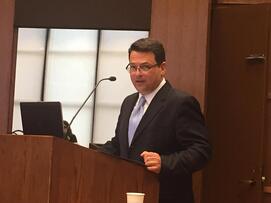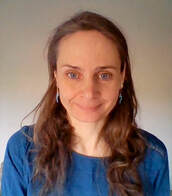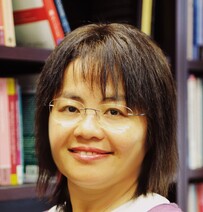Menu
Dr Themistoklis Aravossitas
Lecturer of Hellenic Studies
University of Toronto/ York University, Canada
Lecturer of Hellenic Studies
University of Toronto/ York University, Canada
Heritage Language Education and Vitality Matters: The case of Modern Greek in Canada
Heritage Language Education (HLE) is a distinct field of Bilingual Education which focuses on teaching, learning and preserving minority languages. In Canada, despite a strong multicultural and multilingual tradition, various communities face challenges regarding the maintenance and transgenerational transmission of their linguistic and cultural heritage. While immigrant languages are still taught on the boundaries of mainstream education, provision of institutional support, mainly through HLE programs, remains one of the foundational parameters of ethnolinguistic vitality. In this paper, I am presenting an ongoing community-based study which explores various aspects of the Greek experience in Canada, and addresses some of the most critical issues for HLE and the Greek Diaspora: How is it possible to resist language shift in immigrant communities beyond the third generation? What type of opportunities emerge from new communication and information technologies? What sort of lessons can HLE stakeholders learn from the pandemic? Which are the new tasks for the Greek communities in the Diaspora? Our discussion and analysis of the above questions is based on two models: (a) the Capacity Development, Opportunity Creation, and Desire (COD) developed by Francois Grin (1990) and elaborated by Joseph Lo Bianco (2008), and (b) the Access, Innovation and Motivation (AIM), framework (author, 2016). Throughout the study, two key points emerge as priorities for Greek heritage language education: the need for community-focused synergies, and the adoption of new teaching strategies informed by new technologies and increased situated learning opportunities.
Short bio
Themistoklis Aravossitas teaches Modern Greek Language and Culture, at the Centre for European Studies, University of Toronto, and at the Department of Languages and Linguistics of York University, in Canada. He earned his Ph.D. at the Ontario Institute for Studies in Education and the Knowledge Media Design Institute at the University of Toronto. His doctoral thesis titled “The Hidden Schools”, explores various aspects of Greek Heritage Language Education in Canada. His post-doctoral research at the University of the Aegean in Greece, focused on developing a portal for Greek language teachers and learners in Canada. His publications combine the fields of heritage language pedagogy and the Greek Diaspora. He has co-edited five books, including: International Handbook of Research and Practice in Heritage Language Education (Springer, 2017); Interdisciplinary Research Approaches to Multilingual Education (Routledge, 2018); Language Diversity and Education Matters (Gutenberg, 2019) ;and Language Diversity in Greece: Local Challenges with International Implications (Springer, 2020).
Heritage Language Education (HLE) is a distinct field of Bilingual Education which focuses on teaching, learning and preserving minority languages. In Canada, despite a strong multicultural and multilingual tradition, various communities face challenges regarding the maintenance and transgenerational transmission of their linguistic and cultural heritage. While immigrant languages are still taught on the boundaries of mainstream education, provision of institutional support, mainly through HLE programs, remains one of the foundational parameters of ethnolinguistic vitality. In this paper, I am presenting an ongoing community-based study which explores various aspects of the Greek experience in Canada, and addresses some of the most critical issues for HLE and the Greek Diaspora: How is it possible to resist language shift in immigrant communities beyond the third generation? What type of opportunities emerge from new communication and information technologies? What sort of lessons can HLE stakeholders learn from the pandemic? Which are the new tasks for the Greek communities in the Diaspora? Our discussion and analysis of the above questions is based on two models: (a) the Capacity Development, Opportunity Creation, and Desire (COD) developed by Francois Grin (1990) and elaborated by Joseph Lo Bianco (2008), and (b) the Access, Innovation and Motivation (AIM), framework (author, 2016). Throughout the study, two key points emerge as priorities for Greek heritage language education: the need for community-focused synergies, and the adoption of new teaching strategies informed by new technologies and increased situated learning opportunities.
Short bio
Themistoklis Aravossitas teaches Modern Greek Language and Culture, at the Centre for European Studies, University of Toronto, and at the Department of Languages and Linguistics of York University, in Canada. He earned his Ph.D. at the Ontario Institute for Studies in Education and the Knowledge Media Design Institute at the University of Toronto. His doctoral thesis titled “The Hidden Schools”, explores various aspects of Greek Heritage Language Education in Canada. His post-doctoral research at the University of the Aegean in Greece, focused on developing a portal for Greek language teachers and learners in Canada. His publications combine the fields of heritage language pedagogy and the Greek Diaspora. He has co-edited five books, including: International Handbook of Research and Practice in Heritage Language Education (Springer, 2017); Interdisciplinary Research Approaches to Multilingual Education (Routledge, 2018); Language Diversity and Education Matters (Gutenberg, 2019) ;and Language Diversity in Greece: Local Challenges with International Implications (Springer, 2020).
Dr Simone Pfenninger
Associate Professor of Second Language Acquisition and Psycholinguistics
University of Salzburg
Associate Professor of Second Language Acquisition and Psycholinguistics
University of Salzburg
Emergent bilingual children in early foreign language learning: Focus on variability and dynamicity in L2 development data
Second Language Acquisition research has identified three recent trends that are particularly pervasive in language education of young learners. First, very young foreign language (FL) learners have become a new population of learners, which opens challenging questions regarding not just expectable outcomes but also the very nature and aims of FL learning at this age (Muñoz 2019). Second, as a “major educational initiative” (Heras and Lasagabaster 2015: 72) in Europe, content and language integrated learning (CLIL) has been taking root in recent decades, with the promise that early bilingual instruction will result in higher levels of FL proficiency, while simultaneously equipping students with other key skills such as intercultural awareness (e.g. Wode 2004). Third, today’s multilingual and technology-supported culture is redefining when, why, and how languages – in particular English as a foreign language (EFL) – are learned and used (Douglas Fir Group 2016; Larsen-Freeman 2017). Each of these three topics has received a lot of attention in its own right in SLA, albeit not in interaction with the others.
Drawing on my own research on the long-term EFL development of children attending bilingual and regular (pre)primary FL programs for up to 8 school years in Switzerland, I offer a critical review of empirical and theoretical results concerning understanding of CLIL, age and the extracurricular use of digital technologies. My main goals are (1) to discuss ways to implement dynamically oriented methodology that can provide much needed insights into the inherent dynamic, emergent, and contextually and socially embedded nature of L2 learning in young children, and (2) to outline implications for multilingual education when decisions are made about early teaching of different languages and early instruction through different languages in the FL classroom.
References
Douglas Fir Group. 2016. A transdisciplinary framework for SLA in a multilingual world. Modern Language Journal 100(s1). 19–47.
Heras, A. & D. Lasagabaster. 2015. The impact of CLIL on affective factors and vocabulary learning. Language Teaching and Research 19(1). 70–88.
Larsen-Freeman, D. 2017. Complexity theory: The lessons continue. In Lourdes Ortega & ZhaoHong H. (eds.), Complexity theory and language development: In celebration of Diane Larsen-Freeman, 11–50. Amsterdam: John Benjamins.
Muñoz, C. 2019. A new look at age: young and old L2 learners. In John W. Schwieter & Alessandro Benati (eds.), The Cambridge handbook of language learning, 430–450. Cambridge: CUP.
Wode, Henning. 2004. Frühes Fremdsprachenlernen. Englisch ab Kita und Grundschule: Warum? Wie? Was bringt es? Kiel: Verein für frühe Mehrsprachigkeit an Kindertageseinrichtungen und Schulen FMKS e.V.
Short bio
Simone E. Pfenninger is Associate Professor of Second Language Acquisition and Psycholinguistics at the English Department of the University of Salzburg. Her principal research areas are multilingualism, psycholinguistics and variationist SLA, especially in regard to quantitative approaches and statistical methods and techniques for language application in education. She is co-editor of the Second Language Acquisition book series for Multilingual Matters, Vice President of the International Association of Multilingualism (IAM) and Vice President of the European Second Language Association (EuroSLA).
Second Language Acquisition research has identified three recent trends that are particularly pervasive in language education of young learners. First, very young foreign language (FL) learners have become a new population of learners, which opens challenging questions regarding not just expectable outcomes but also the very nature and aims of FL learning at this age (Muñoz 2019). Second, as a “major educational initiative” (Heras and Lasagabaster 2015: 72) in Europe, content and language integrated learning (CLIL) has been taking root in recent decades, with the promise that early bilingual instruction will result in higher levels of FL proficiency, while simultaneously equipping students with other key skills such as intercultural awareness (e.g. Wode 2004). Third, today’s multilingual and technology-supported culture is redefining when, why, and how languages – in particular English as a foreign language (EFL) – are learned and used (Douglas Fir Group 2016; Larsen-Freeman 2017). Each of these three topics has received a lot of attention in its own right in SLA, albeit not in interaction with the others.
Drawing on my own research on the long-term EFL development of children attending bilingual and regular (pre)primary FL programs for up to 8 school years in Switzerland, I offer a critical review of empirical and theoretical results concerning understanding of CLIL, age and the extracurricular use of digital technologies. My main goals are (1) to discuss ways to implement dynamically oriented methodology that can provide much needed insights into the inherent dynamic, emergent, and contextually and socially embedded nature of L2 learning in young children, and (2) to outline implications for multilingual education when decisions are made about early teaching of different languages and early instruction through different languages in the FL classroom.
References
Douglas Fir Group. 2016. A transdisciplinary framework for SLA in a multilingual world. Modern Language Journal 100(s1). 19–47.
Heras, A. & D. Lasagabaster. 2015. The impact of CLIL on affective factors and vocabulary learning. Language Teaching and Research 19(1). 70–88.
Larsen-Freeman, D. 2017. Complexity theory: The lessons continue. In Lourdes Ortega & ZhaoHong H. (eds.), Complexity theory and language development: In celebration of Diane Larsen-Freeman, 11–50. Amsterdam: John Benjamins.
Muñoz, C. 2019. A new look at age: young and old L2 learners. In John W. Schwieter & Alessandro Benati (eds.), The Cambridge handbook of language learning, 430–450. Cambridge: CUP.
Wode, Henning. 2004. Frühes Fremdsprachenlernen. Englisch ab Kita und Grundschule: Warum? Wie? Was bringt es? Kiel: Verein für frühe Mehrsprachigkeit an Kindertageseinrichtungen und Schulen FMKS e.V.
Short bio
Simone E. Pfenninger is Associate Professor of Second Language Acquisition and Psycholinguistics at the English Department of the University of Salzburg. Her principal research areas are multilingualism, psycholinguistics and variationist SLA, especially in regard to quantitative approaches and statistical methods and techniques for language application in education. She is co-editor of the Second Language Acquisition book series for Multilingual Matters, Vice President of the International Association of Multilingualism (IAM) and Vice President of the European Second Language Association (EuroSLA).
Prof. Andrea Révész
Professor of Second Language Acquisition
University College London
Professor of Second Language Acquisition
University College London
Using eye-tracking as a research and pedagogical tool: Insights from research on focus on form
In the field of SLA, it is generally assumed that, to optimise development, attention needs to be drawn to linguistic features (Schmidt, 2001). Some researchers have also argued that a focus on language or form is best achieved when linguistic information is supplied to learners in meaningful contexts through reactive pedagogic techniques (Long, 1996). To study the effects of focus-on-form interventions on attentional allocation, eye-tracking methodology is increasingly used by researchers (Conklin et al., 2018; Godfroid, 2020). So far, however, little research has considered the capability of eye-tracking as a pedagogical tool to initiate focus on form.
I will start this talk with a brief review of the theoretical rationale for focus on form. Then, I will discuss and demonstrate how the effectiveness of reactive focus-on form techniques may be explored by the means of eye-tracking methodology in the context of multi-media learning. Next, I will consider the pedagogical potential of eye-tracking. Specifically, I will explore the extent to which the gaze-contingency affordance of eye-tracking (i.e., the possibility of designing pedagogical interventions that can react to and interact with eye-movements) may facilitate attention to and learning of L2 constructions. In doing so, I will draw on my own and colleagues’ work (Lee & Révész, 2020; Révész et al., in press). The talk will conclude with a discussion of future research directions with a view to informing L2 instruction.
Short bio
Andrea Révész is a Professor of Second Language Acquisition at the UCL Institute of Education, University College London. Her main research interests lie at the interfaces of second language acquisition, instruction and assessment, with particular emphases on the roles of task, input, interaction, and individual differences in SLA. Currently, she is also working on projects investigating the cognitive processes underlying second language performance. She is co-winner of the 2017 TBLT Best Research Article Award and co-recipient of the 2018 TESOL Award for Distinguished Research. Currently, she serves as associate editor of the journal Studies in Second Language Acquisition and is Vice-President of the International Association for Task-based Language Teaching (TBLT).
In the field of SLA, it is generally assumed that, to optimise development, attention needs to be drawn to linguistic features (Schmidt, 2001). Some researchers have also argued that a focus on language or form is best achieved when linguistic information is supplied to learners in meaningful contexts through reactive pedagogic techniques (Long, 1996). To study the effects of focus-on-form interventions on attentional allocation, eye-tracking methodology is increasingly used by researchers (Conklin et al., 2018; Godfroid, 2020). So far, however, little research has considered the capability of eye-tracking as a pedagogical tool to initiate focus on form.
I will start this talk with a brief review of the theoretical rationale for focus on form. Then, I will discuss and demonstrate how the effectiveness of reactive focus-on form techniques may be explored by the means of eye-tracking methodology in the context of multi-media learning. Next, I will consider the pedagogical potential of eye-tracking. Specifically, I will explore the extent to which the gaze-contingency affordance of eye-tracking (i.e., the possibility of designing pedagogical interventions that can react to and interact with eye-movements) may facilitate attention to and learning of L2 constructions. In doing so, I will draw on my own and colleagues’ work (Lee & Révész, 2020; Révész et al., in press). The talk will conclude with a discussion of future research directions with a view to informing L2 instruction.
Short bio
Andrea Révész is a Professor of Second Language Acquisition at the UCL Institute of Education, University College London. Her main research interests lie at the interfaces of second language acquisition, instruction and assessment, with particular emphases on the roles of task, input, interaction, and individual differences in SLA. Currently, she is also working on projects investigating the cognitive processes underlying second language performance. She is co-winner of the 2017 TBLT Best Research Article Award and co-recipient of the 2018 TESOL Award for Distinguished Research. Currently, she serves as associate editor of the journal Studies in Second Language Acquisition and is Vice-President of the International Association for Task-based Language Teaching (TBLT).
Prof. Virginia Yip
Professor of Linguistics
The Chinese University of Hong Kong
Professor of Linguistics
The Chinese University of Hong Kong
Language diversity and bilingual first language acquisition
This paper discusses the issue of language diversity in the context of bilingual first language acquisition (BFLA). Given 7000 languages, there are over 24 million possible language pairs which bilingual children might acquire (Yip, Mai and Matthews 2018). In current research and databases including CHILDES (MacWhinney 2000), English and Indo-European languages dominate: even non-Indo-European languages are typically paired with an Indo-European language. Referring to studies involving East Asian languages like Chinese, we outline how typological and contact relationships between language pairs may influence the course of BFLA. Whether in bilingual, multilingual or heritage language acquisition, the current trend is to move away from the monolingual bias based on the ideal hearer-speaker toward a more complex understanding of how languages interact and come in contact in the mind.
Examples illustrating possible forms of crosslinguistic influence will be drawn from the Chinese-English pair in homeland and heritage contexts (Yip and Matthews 2007, Mai, Matthews and Yip 2018). Language acquisition will be better understood when the language pairs are diversified to include more different languages in the empirical data base as well as theorization of language acquisition across acquisition contexts.
Short bio
Virginia Yip is Professor of Linguistics at the Chinese University of Hong Kong. She is Director of the Childhood Bilingualism Research Centre, University of Cambridge-CUHK Joint Laboratory for Bilingualism and the Chinese University of Hong Kong-Peking University-University System of Taiwan Joint Research Centre for Language and Human Complexity. Her research interests include early childhood development, language and cognitive development, bilingualism, bilingual acquisition, second language acquisition, Cantonese, Chaozhou and comparative Chinese grammar, psycholinguistics and cognitive neuroscience.
The monograph The Bilingual Child: Early Development and Language Contact, co-authored with Stephen Matthews (Cambridge University Press) received the Linguistic Society of America’s Leonard Bloomfield Book Award in 2009. She is an editor of Journal of Chinese Linguistics and has served on the editorial board of numerous leading journals in bilingualism and language acquisition.
This paper discusses the issue of language diversity in the context of bilingual first language acquisition (BFLA). Given 7000 languages, there are over 24 million possible language pairs which bilingual children might acquire (Yip, Mai and Matthews 2018). In current research and databases including CHILDES (MacWhinney 2000), English and Indo-European languages dominate: even non-Indo-European languages are typically paired with an Indo-European language. Referring to studies involving East Asian languages like Chinese, we outline how typological and contact relationships between language pairs may influence the course of BFLA. Whether in bilingual, multilingual or heritage language acquisition, the current trend is to move away from the monolingual bias based on the ideal hearer-speaker toward a more complex understanding of how languages interact and come in contact in the mind.
Examples illustrating possible forms of crosslinguistic influence will be drawn from the Chinese-English pair in homeland and heritage contexts (Yip and Matthews 2007, Mai, Matthews and Yip 2018). Language acquisition will be better understood when the language pairs are diversified to include more different languages in the empirical data base as well as theorization of language acquisition across acquisition contexts.
Short bio
Virginia Yip is Professor of Linguistics at the Chinese University of Hong Kong. She is Director of the Childhood Bilingualism Research Centre, University of Cambridge-CUHK Joint Laboratory for Bilingualism and the Chinese University of Hong Kong-Peking University-University System of Taiwan Joint Research Centre for Language and Human Complexity. Her research interests include early childhood development, language and cognitive development, bilingualism, bilingual acquisition, second language acquisition, Cantonese, Chaozhou and comparative Chinese grammar, psycholinguistics and cognitive neuroscience.
The monograph The Bilingual Child: Early Development and Language Contact, co-authored with Stephen Matthews (Cambridge University Press) received the Linguistic Society of America’s Leonard Bloomfield Book Award in 2009. She is an editor of Journal of Chinese Linguistics and has served on the editorial board of numerous leading journals in bilingualism and language acquisition.




